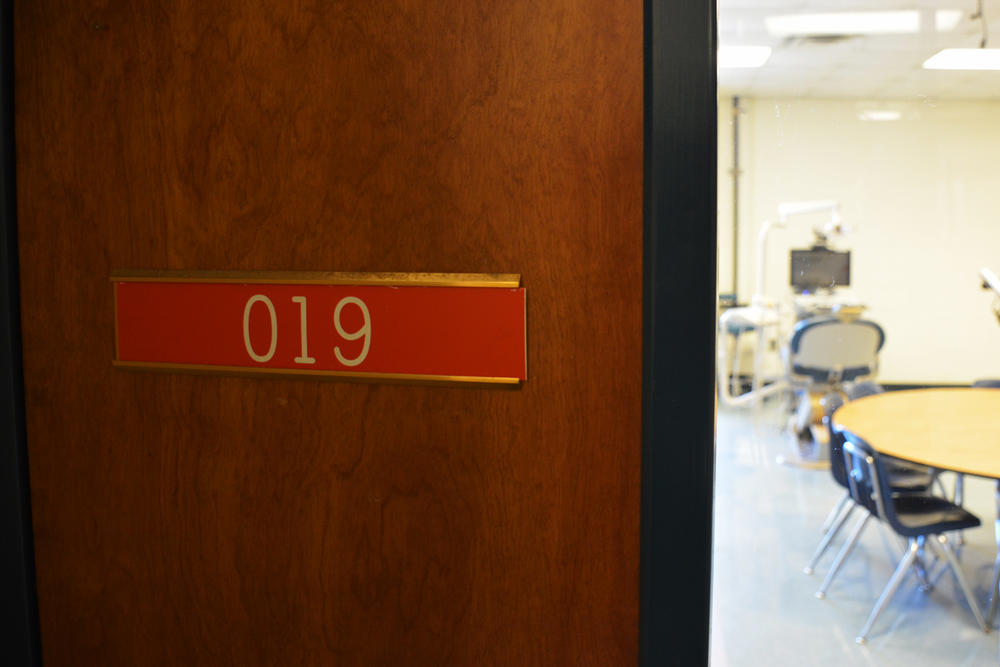Section Branding
Header Content
Breaking Down Barriers To Dental Care For Thousands Of Georgia Children
Primary Content
Tens of thousands of Georgia children never get their teeth cleaned.
It’s partly a problem of geography: kids have to travel too far to get to a dentist. Then there’s state law, which says a dentist must be present when a dental hygienist is working.
But that could change this year because of a set of bills in the General Assembly that would make it easier for hygienists to offer services on their own.
Such a change could have a big impact at Turner County Elementary in the small, south Georgia city of Ashburn where more than a quarter of the population lives below the poverty line.
On a recent afternoon, students filed down the hallway past Room 19. It’s not your your standard classroom. Inside sit three used dental chairs and boxes of medical equipment.
“A new vacuum pump, a new autoclave, which is a sterilizer. We were able to get a portable X-ray machine, and an air compressor,” said Brenda Lee from Turner Family Connection.
The nonprofit brought the equipment here for their dental clinic three years ago so the school’s students, all of whom qualify for free and reduced price meals, could easily access teeth cleanings and fluoride treatments.
But the clinic has never seen a patient.
“We’ve got the full clinic set up. It’s just a matter of getting personnel in here to operate it,” Lee said.
Dentists are scarce here, as they are all over rural Georgia, and current state law says hygienists can only practice with a dentist in the same building. So, Room 19 stays closed.
“My practice is just wrapped up all the time. Quite frankly, [there’s] not enough of me to go around,” said Michael Dent, who’s one of just two full-time dentists in Turner County.
He said he’d love to help the clinic out, but can’t take time away from his own patients.
“I just see so many kids especially, who just, they have not seen anyone, and it’s just a huge need. Access to care is a very big issue,” Dent said.
A recent study from Georgia Tech says few of the state’s dentists accept public insurance for children like Medicaid or PeachCare for Kids. In rural areas, that makes getting to a dentist harder.
Dent said freeing up hygienists to clean teeth without direct supervision would help solve that problem.
“These kids need someone. Just seeing the hygienist is a huge thing. I think that could be very positive for this state, especially in rural Georgia,” he said.
This year, state lawmakers are considering two measures to make that possible. One bill is sponsored by Senator Renee Unterman (R-Buford).
“It’s so simple, and it sounds so logical that you would not have to have a dentist in a brick and mortar building to be able to deliver care to people who desperately need care,” Unterman said when introducing the legislation in December.
It’s the latest part of a multi-year effort to free up hygienists to practice on their own in places like schools and nursing homes. A similar bill died in a House committee last year because of strong opposition from the state’s dentists.
That means Georgia remains one of just three states that require dentists to be in the same building as dental hygienists when they practice.
“Are we slow to change? Yes,” said Frank Capaldo, who heads the Georgia Dental Association.
Speaking among the hubbub at the state Capitol, he said last year’s legislation didn’t do enough to protect patient safety.
But there were also concerns the bill would be a first step to allowing hygienists to leave dental offices entirely and start their own practices.
“Is it a little bit of trying to help our dentists as small businesses in the state, too?” Capaldo asked. “Yeah, but I think that’s part of our duty and the duty of the state.”
This year, the Georgia Dental Association supports a different bill that would free up hygienists.
It would block private practice, but it’s a bit more specific when it comes to safety and privacy requirements. Capaldo said he’s hopeful the measure will pass.
Back at Turner County Elementary, Brenda Lee stepped outside of Room 19. She said she’s heartbroken to see children walk by the dental clinic they can’t use.
“It’s very frustrating to think we could provide these services if we just had that opportunity to have a provider come in and offer the services,” Lee said.
After three years of waiting, she’s open to any measure that will finally help her fill those empty dental chairs.
Correction: This story originally stated that HB 684, which failed to pass the Georgia General Assembly last year, would have allowed independent practice for dental hygienists. The bill would not have allowed that but did raise concerns about future measures to allow independent practice for hygienists.




